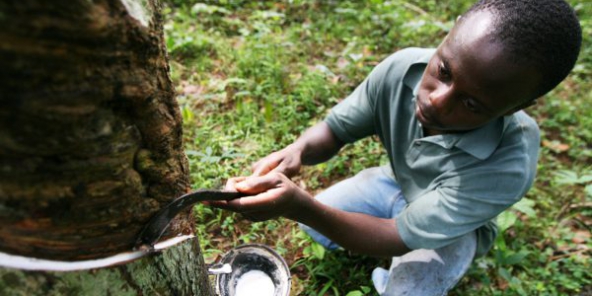WARA has decided to affirm the long-term rating of the African Rubber Planting Company (SAPH), the leader in natural rubber production in Ivory Coast, at BBB, while changing its perspective to “positive”.
In a report dated May 17, 2018,
West Africa Rating Agency (WARA) indicates that on its regional scale, the long-term rating of SAPH remains “BBB”, still in investment grade.
Its short-term rating also remains unchanged at “w-4”.
On the other hand, the perspective goes from stable to positive.
At the same time, on its international scale, WARA affirms SAPH’s rating and modifies its perspective as follows: iB / Positive / iw-6.
The rating reflects SAPH’s leading position in Côte d’Ivoire, the sound governance of the SIFCA group, but above all SAPH’s strong adaptability to the ad hoc effects of exogenous factors (price volatility, competitive pressure, operational environment).
WARA notes that SAPH has been able to adapt to an unfavorable environment (lasting drop in SICOM prices) with the implementation in 2014 of a capacity increase and cost optimization program that is beginning to bear fruit “Says Hamza HAJI, the analyst in charge of SAPH’s rating. In addition, SAPH took advantage of the improved prices in late 2016 and early 2017 to restore margins.
On the other hand, the rating is constrained by the “mono-product” nature of society, its dependence on world rubber prices and the national environment, which is unstable both politically and economically.
In particular, in a structurally surplus rubber market, the sustainable rise in prices is not expected before 2020.
“It is now up to SAPH, knowing this context, to continue the efforts of expansion and saturation of its production tool to strengthen its position as market leader.”
Created in 1956 by the State, at the same time as the rubber industry, SAPH was privatized in 1992, then sold to SIFCA in 1999. SAPH is now a major player in the natural rubber market in Africa with nearly 28% market share in Côte d’Ivoire, giving it a global market share of almost 1%.
SAPH has 5 natural rubber production plants in Côte d’Ivoire, spread all over the country and which produce more than 160,000 tonnes of natural rubber per year.
An improvement in SAPH’s rating depends on: i) a sustainable and structural increase in SICOM prices .; (ii) technical innovations derived from agronomic research (in particular the evolution of tree clones) making it possible to sustainably increase the marginal productivity of rubber trees and their resistance to diseases and fungi; (iii) continued investment and cost optimization efforts to further reduce the breakeven point; and (iv) improved industrial and management processes, particularly for better quality control of its purchases.
A deterioration of the SAPH rating would be the consequence of: i) a new political or health crisis impacting Côte d’Ivoire; (ii) the loss of market share of SAPH in its domestic market; iii) the significant and lasting drop in SICOM prices; or (iv) the appearance of new diseases or fungi impacting the productivity of rubber trees in Côte d’Ivoire, or of a major natural disaster leading to the destruction of plantations in Côte d’Ivoire (these risks are not not insured for lack of specialized counterpart).
The perspective is positive. Indeed, WARA believes that the probability of occurrence of the favorable scenarios is greater than that of the adverse medium-term scenarios, which means in other words that the current rating of SAPH contains more opportunities for enhancement than risks of lowering. .
The methodology that WARA uses for the rating of the African Society of Hevea Plantations (SAPH) is the rating methodology of industrial and commercial companies, published on July 15, 2012, revised in September 2016 and available on the website of WARA ( www.emergingmarketsratings.com).



